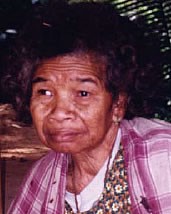Kintaq in Malaysia

Photo Source:
Copyrighted © 2026
Southeast Asia Link - SEALINK All rights reserved. Used with permission |
Send Joshua Project a map of this people group.
|
| People Name: | Kintaq |
| Country: | Malaysia |
| 10/40 Window: | Yes |
| Population: | 100 |
| World Population: | 200 |
| Primary Language: | Kintaq |
| Primary Religion: | Ethnic Religions |
| Christian Adherents: | 1.20 % |
| Evangelicals: | 1.00 % |
| Scripture: | Translation Started |
| Ministry Resources: | No |
| Jesus Film: | No |
| Audio Recordings: | No |
| People Cluster: | West Malaysia Indigenous |
| Affinity Bloc: | Malay Peoples |
| Progress Level: |
|
Introduction / History
The Kintaq are one of the nineteen Orang Asli people groups living in Peninsular Malaysia. They come under the Semang (officially called Negrito) subgroup. Their language is very close to that of the Kensiu, another Orang Asli tribe with whom they share settlements and have close socioeconomic relations.
Most of the nomadic Kintaq have settled down mainly in the jungle areas of Grik in the Hulu Perak district of Perak. A few Kintaq live in Kelantan.
What Are Their Lives Like?
Their main economic activities are hunting and gathering jungle produce. They collect forest produce for trade in the local market as well as for their own consumption. Some have learned basic farming, but the harvest is never enough to support their families. A few make their living as employees in plantations and factories.
Like the Kensiu, the Kintaq have very little formal education. They have also resisted schooling because of its association with Malay culture and the Islamic religion. Most of them are illiterate and uneducated. Therefore, they struggle to keep pace with the other people groups in a developing and fast changing Malaysian society.
Traditionally, the Kintaq were nomadic people moving in bands within a defined area. They dressed in rudimentary clothing made from bark, roots, leaves, and fibers of trees and vines. Since commercialization has spread even to the remotest areas in the Malay Peninsula, most have settled down permanently. Today, they live in standard houses developed by the Department of Aborigines Affairs - a small version of a the rural Malay house. Prefabricated from wooden timbers and planks, a typical Kintaq house is a rectangular structure on short posts with a veranda at the front, one or two living or sleeping rooms, and a kitchen at the back.
They have also adopted modern clothing for the monthly occasions when they come in touch with the outside world. Their small stature, dark brown skin and curly, kinky hair make them rather easily distinguished from other people.
What Are Their Beliefs?
The Kintaq are basically animists. Most of them follow their traditional religion, a complex set of beliefs and practices that connect them to their environment and fellow Kintaq. They have a large body of myths and legends together with a belief in supernatural deities. They also perform diverse religious practices, many of which are borrowed from neighboring tribes. However, they would deny having a certain form of worship and belief. Like their cousin Kensiu, their outlook on life is "Live for today. Let tomorrow take care of itself." They believe that nature will give blessings, but they also believe in the presence of spirits in places like bridges, graves, and nature.
What Are Their Needs?
The Kintaq have been left behind in the rising prosperity of the nation. In effect, they are becoming even poorer. To make matters worse, they are not receiving any formal education or skills training. Pray that God will call out resourceful believers to help them from even a more difficult situation in the future. Pray for "beautiful feet" that will travel to tell the Kintaq the good news.
Prayer Points
Pray for workers to go to the Kintaq people, and for their hearts to be ready to receive their savior.
Pray for families of believers loving and serving others to grow reproducing churches.
Pray for a chain reaction of families reaching families that results in thousands of new believers who share their faith with others.
Pray for grace and truth expanding into their entire society as all believers learn to love others.